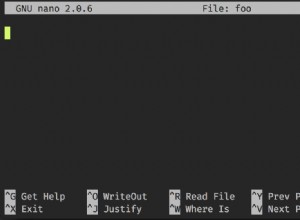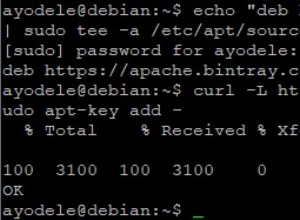In MongoDB, il $pow l'operatore della pipeline di aggregazione eleva un numero all'esponente specificato e restituisce il risultato
$pow accetta due espressioni, fornite in un array. Il primo è il numero e il secondo è l'esponente. Entrambe possono essere qualsiasi espressione valida, purché si risolvano in un numero.
Esempio
Supponiamo di avere una collezione chiamata test con i seguenti documenti:
{ "_id" : 1, "data" : 10 }
{ "_id" : 2, "data" : -3 }
{ "_id" : 3, "data" : 0 }
{ "_id" : 4, "data" : null }
Possiamo usare il $pow operatore per raccogliere i data campo di un esponente specificato:
db.test.aggregate(
[
{ $project: {
_id: 0,
result: { $pow: [ "$data", 3 ] }
}
}
]
)Risultato:
{ "result" : 1000 }
{ "result" : -27 }
{ "result" : 0 }
{ "result" : null }
In questo caso, ho usato i data campo come numero e 3 come esponente. Pertanto, ogni documento aveva i suoi data campo sollevato dalla potenza di 3.
Possiamo vedere che null i valori restituiscono null .
Il risultato è generalmente dello stesso tipo dell'input. Tuttavia, ci sono eccezioni a questa regola. Nello specifico:
- Un intero a 32 bit verrà convertito in un intero a 64 bit se il risultato è rappresentabile come un intero a 64 bit.
- Un intero a 32 bit verrà convertito in un double se il risultato non è rappresentabile come un intero a 64 bit.
- Un intero a 64 bit verrà convertito in double se il risultato non è rappresentabile come un intero a 64 bit.
Esponente negativo
Non puoi aumentare lo zero (0 ) con esponente negativo.
Esempio:
db.test.aggregate(
[
{ $match: { _id: 3 } },
{ $project: {
_id: 0,
result: { $pow: [ "$data", -3 ] }
}
}
]
)Risultato:
uncaught exception: Error: command failed: {
"ok" : 0,
"errmsg" : "$pow cannot take a base of 0 and a negative exponent",
"code" : 28764,
"codeName" : "Location28764"
} : aggregate failed :
example@sqldat.com/mongo/shell/utils.js:25:13
example@sqldat.com/mongo/shell/assert.js:18:14
example@sqldat.com/mongo/shell/assert.js:618:17
example@sqldat.com/mongo/shell/assert.js:708:16
example@sqldat.com/mongo/shell/db.js:266:5
example@sqldat.com/mongo/shell/collection.js:1046:12
@(shell):1:1 L'errore afferma esplicitamente che "$pow non può assumere una base di 0 e un esponente negativo “.
Tuttavia, se escludiamo il documento 3, non riceviamo più l'errore:
db.test.aggregate(
[
{ $match: { _id: { $nin: [ 3 ] } } },
{ $project: {
result: { $pow: [ "$data", -3 ] }
}
}
]
)Risultato:
{ "_id" : 1, "result" : 0.001 }
{ "_id" : 2, "result" : -0.037037037037037035 }
{ "_id" : 4, "result" : null } Valori NaN
Se l'argomento si risolve in NaN , $pow restituisce NaN .
Esempio:
db.test.aggregate(
[
{ $project: {
_id: 0,
result: { $pow: [ "$data" * 1, 3 ] }
}
}
]
)Risultato:
{ "result" : NaN }
{ "result" : NaN }
{ "result" : NaN }
{ "result" : NaN } Campi inesistenti
Se il $pow operatore viene applicato a un campo che non esiste, null viene restituito.
Esempio:
db.test.aggregate(
[
{ $project: {
_id: 0,
result: { $pow: [ "$beer", 3 ] }
}
}
]
)Risultato:
{ "result" : null }
{ "result" : null }
{ "result" : null }
{ "result" : null } Esponente nullo
Abbiamo già visto che è null valore restituisce null . Questo vale anche quando si fornisce null come esponente.
Esempio:
db.test.aggregate(
[
{ $project: {
_id: 0,
result: { $pow: [ "$data", null ] }
}
}
]
)Risultato:
{ "result" : null }
{ "result" : null }
{ "result" : null }
{ "result" : null } 



